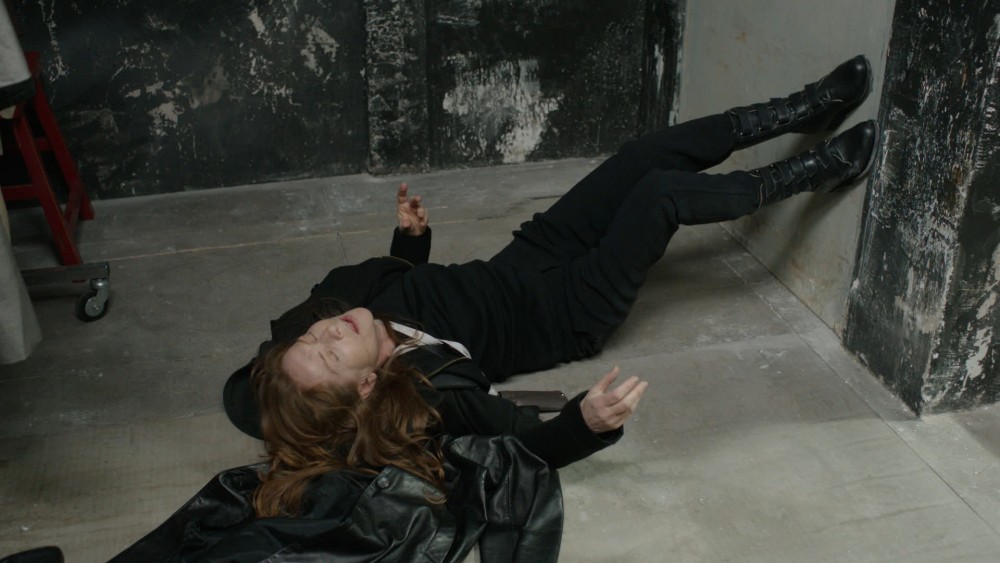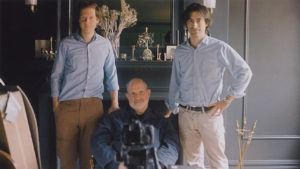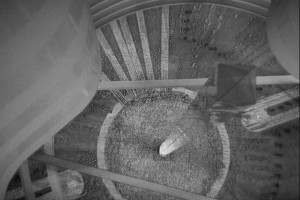
It pains me to admit this just before writing a review of Catherine Breillat’s latest film, but I’ve only actually watched two of her works — Fat Girl and Romance — prior to this. Regardless of that fact, I’ve read a surprising amount about her themes as friends have recommended her to me before, and I’ve only found myself more compelled to explore her work with each new-to-me film I watch. With that admittance now on the table, here’s what I have to say about the film at hand: Abuse of Weakness is a great work, and one that’s rather hard to believe is actually mostly autobiographical.
Breillat’s film tells the tale of Maud Schainberg (Isabelle Huppert), a filmmaker who suffers a stroke and engages in a strange relationship with a known con artist, Vilko Piran (Kool Shen), during her recovery. Presumably, she does this all for the sake of making a film and casting this eccentric man as the lead character, but as is typical in Breillat’s work, nothing is quite so concrete. What’s atypical about this narrative though is the fact that this frustrating tale, from stroke to the loss of thousands upon thousands of euros, is all based on what Breillat went through just a few years ago (and wrote a novel of the same name about).
Abuse of Weakness is an absolute assault on the audience from the get-go — its first ten minutes that solely feature Schainberg suffering through the first stages of stroke recovery especially so — but that’s not at all a bad thing. Breillat is incredibly up-front about every hardship she seemed to endure throughout, and while the film may be accused of having the same clinical gaze as most of her work might when looking in at a situation, no one can say it’s an impersonal work. Far from it really, as it often becomes uncomfortable just how unflinchingly personal it is.
One scene where this is painfully clear is in the film’s earliest moments, when the director tells a doctor that what she’d really like to do is laugh, as it was something she truly loved and cannot do anymore. In that moment, the doctor teaches her to make “eee” and “ooo” sounds, exaggerating her facial movements while staring into a pocket mirror. It’s excruciating to watch, but it makes every single laugh she gives later in the film count, especially because she seems to revel in having that wondrous form of expression back. Even though we recognize that she is in a situation that would typically provoke nothing but sadness, it’s almost refreshing to see her smile while dealing with this rough experience.
This is a game of cat-and-mouse like no other that has been portrayed in recent years; the two are shown to be almost as close as lovebirds, vaguely romantic music occasionally accompanying their moments together. They dine together, laugh together, discuss all sorts of foolishly unrealistic projects together. Moments later though, we receive a direct contrast to that, with an eerie violin playing over scenes of her writing check after check to satiate his every longing and non-existent necessity. At times, it’s as though they each solely exist to challenge each other, but it’s clear there’s more to their relationship present on screen even though Breillat refuses to spell out exactly why they remain in each other’s lives.
It is in her refusal to be up front about character motivations that some will find most riveting about Abuse of Weakness and others will find most frustrating. Breillat is practically relentless with this film, not only in her depiction of the struggles of trying to maintain a vaguely normal life after a stroke, but in her critique of her own self. In the hands of an actress less capable than Isabelle Huppert, a character this demanding would likely fall into a considerably melodramatic realm. It’s a role that requires her to convey both the emotional and physical toll that a stroke and an emotionally manipulative relationship can have on a woman, and she nails it every step of the way. Huppert has always managed to portray vulnerability in her characters when necessary (which is more often than not if we’re being realistic), and it’s no surprise that she delivers an intense performance here when paired with a woman as uncompromising as Breillat.
Much can and should be said about Kool Shen just as well, who never betrays Breillat’s vision of his character by portraying him as anything other than the con-artist he is. He’s got a stone-cold face that’s perfect for the role, and it’s a performance that doesn’t allow any room for sympathy. He’s the kind of man who would prey on a vulnerable woman, and regardless of our feelings towards the protagonist’s decisions in the film, one thing is certain: Vilko Piran is never meant to be trusted.
From the very moment that this con-artist enters her life through an interview on a television screen, Maud (and by association Breillat herself) never seems to stop wondering if she’s truly interested in having Vilko in her life. Even though their interactions are sometimes mundane, each one provides her with a shot of adrenaline that propels her to fall further into association with this man she knows is bad for her. But with Abuse of Weakness, Catherine Breillatdoesn’t attempt to excuse what she did or condemn herself entirely, only saying “It was me, but it wasn’t me,” as she stares painfully into the camera. After all, she challenges, is anyone really able to cast judgment on whether or not a woman’s decisions are right or wrong when placed in such a vulnerable role?
–
Abuse of Weakness opens at the Miami Beach Cinematheque on Friday, August 22nd.
Directed by Catherine Breillat; written and adapted from the the novel by Catherine Breillat; starring Isabelle Huppert and Kool Shen; 105 minutes.



 Derek
Derek
 Isabelle
Isabelle